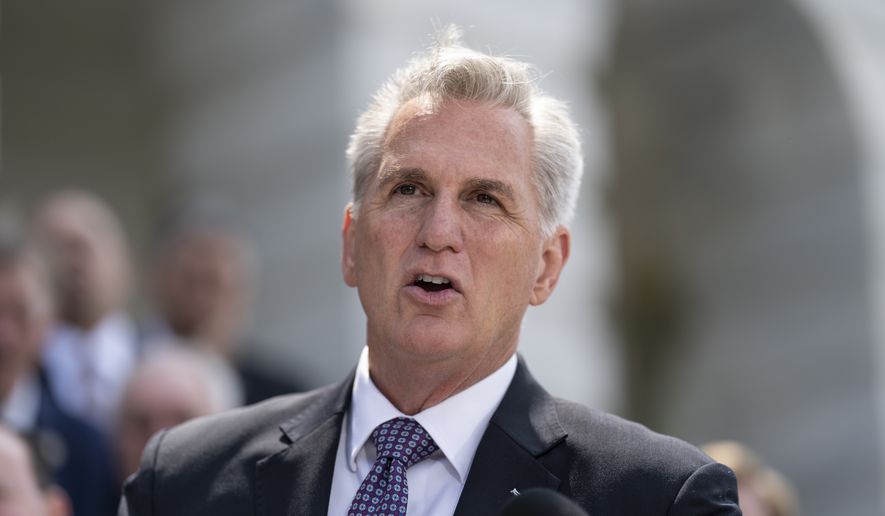House and Senate negotiators working to secure a deal to raise the nation’s borrowing limit are weighing a plan that could eventually give the federal government expanded authority to greenlight an extended phalanx of interstate transmission lines for wind, solar and hydropower.
Republicans leading the talks have offered Democrats a commitment to work on a transmission line proposal as part of an energy side deal in negotiations to raise the $31.4 trillion federal borrowing limit to meet a June 1 deadline.
The Republican proposal gives preference to fossil fuels and immediately streamlines the permitting process to speed up energy projects — mostly involving oil and gas — under the National Environmental Policy Act. It also pledges that Congress, at some point, will work on a measure to accelerate the construction of interstate transmission lines critical to wind, solar and hydroelectric power.
Democrats downplayed the deal because it postpones the renewable energy component and makes no guarantees that the transmission line proposal will be implemented or even get a vote in Congress.
“That is hard no,” said Sen. Brian Schatz, Hawaii Democrat. “No transmission, no deal. We’re not doing the ‘gladly pay you tomorrow for a hamburger today.’”
Republicans, eager to speed up oil and gas production permits, say they will keep trying to shoehorn a bipartisan energy proposal into the must-pass debt limit legislation.
“Permitting reform is on the table,” Sen. Shelley Moore Capito, West Virginia Republican, told The Times. “It has to be together, with transmission lines.”
The talks on raising the borrowing limit have dragged on without notable progress as Democrats and Republicans haggle over spending cuts, the energy deal and other policy changes sought by House and Senate Republican lawmakers.
House Speaker Kevin McCarthy said he is confident that Republican unity on cutting spending in exchange for raising the debt limit will force President Biden to make concessions.
“I’m optimistic about our ability to work together,” said Mr. McCarthy, California Republican. “Do we have obstacles? Yes, we have a big obstacle in the White House. But we’re going to change the course of history because we’re going to stand for the American public.”
House Republicans say any deal to raise the debt ceiling should include at least $130 billion in immediate spending cuts. Mr. McCarthy has said half of that money can be made up by rescinding more than $60 billion in unspent pandemic relief. Republicans also want to cap spending growth by 1%.
Democrats are open to a COVID-19 funding clawback, provided it doesn’t impact money already promised to state and local governments.
Republicans also seek to expand work requirements for welfare recipients, which Mr. Biden has said he would consider but House and Senate Democrats oppose.
Republicans are eager to keep an energy side deal on the table to accelerate what is now a yearslong federal permitting process for oil and gas production and mining projects.
Democrats want Republicans to agree to a more immediate and guaranteed route to expanding the nation’s renewable energy transmission lines.
The Department of Energy, which under the Biden administration is trying to reduce the use of fossil fuels, estimated that the U.S. must expand electricity transmission systems by 60% within the next seven years and may need to triple the size of the system by 2050 “to connect more communities to cheaper, cleaner power and meet growing electricity needs.”
Solar, wind and hydroelectric power now supply about 21% of U.S. electricity. Green energy proponents say that number would increase significantly if renewable energy, particularly more reliable hydropower, could be transported across state lines.
Building interstate transmission lines for renewable power faces permitting delays and opposition from states that don’t want the unsightly infrastructure or its environmental impact in their backyards.
Such opposition has slowed or prevented the construction of transmission lines in New England and elsewhere.
Mr. Biden and congressional Democrats are ultimately seeking legislation giving the Federal Energy Regulatory Commission additional authority to approve the projects, making it harder for states to block the transmission lines and speed up construction. The new lines would expand the role of wind, solar and hydropower in the nation’s electric grid and help fulfill a top Biden administration goal of building a 100% clean energy grid by 2035.
“We’ve got to get that clean energy where it’s needed by accelerating the deployment of transmission and making permitting more efficient and predictable for interstate transmission projects,” White House senior policy adviser John Podesta said last week in a Bipartisan Policy Center speech. “Congress should give FERC clear authority to issue permits for interstate transmission lines.”
• Haris Alic can be reached at halic@washingtontimes.com.
• Susan Ferrechio can be reached at sferrechio@washingtontimes.com.
• Ramsey Touchberry can be reached at rtouchberry@washingtontimes.com.




Please read our comment policy before commenting.